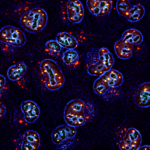Lien vers Pubmed [PMID] – 28134258
Nat. Rev. Cancer 2017 01;
Post-translational protein modification by small ubiquitin-like modifier (SUMO), termed sumoylation, is an important mechanism in cellular responses to stress and one that appears to be upregulated in many cancers. Here, we examine the role of sumoylation in tumorigenesis as a possibly necessary safeguard that protects the stability and functionality of otherwise easily misregulated gene expression programmes and signalling pathways of cancer cells.
